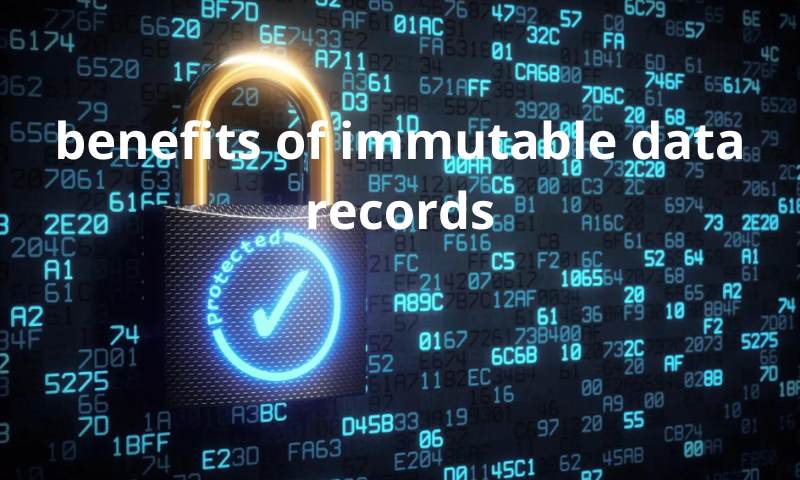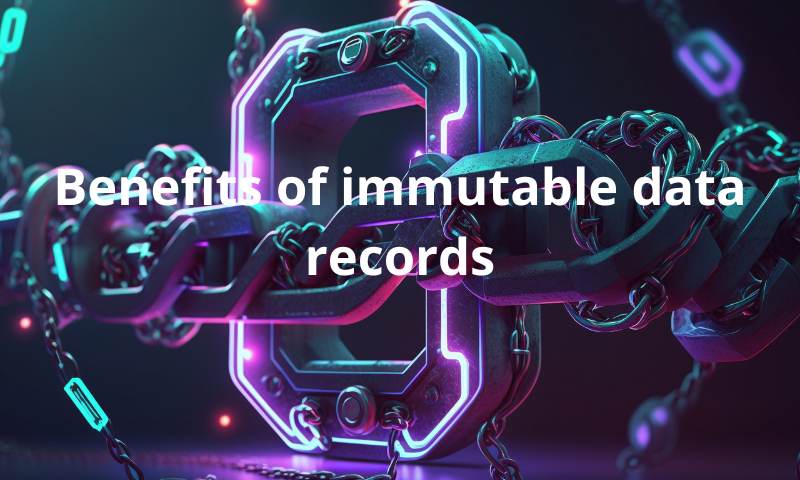Immutable Data Records: 5 Surprising Advantages You Can’t Ignore
Imagine never second-guessing your data’s history. In a world where digital info shifts and changes like sand, the benefits of immutable data records stand like a beacon of stability. I’m here to unveil how locking down your data can unleash a host of perks you wouldn’t want to miss. From sealing the doors against data tampering to ensuring an airtight audit trail, there’s a ton up for grabs. Join me, and let’s explore why you should cement your data in stone.
Unlocking the Potential of Immutable Data Records
Increase in Data Integrity and Audit Trail Reliability
Immutable data boosts data integrity. It makes sure records don’t change. At its heart, immutable data advantages mean we can trust in data accuracy every single time. If you’re unsure about what “data integrity” means, think of it like building with super strong bricks. They won’t crack or warp. In the same way, data stays whole and unbroken, so you can rely on it without doubt.
Now, let’s chat about audit trails. These are like footprints that show who went where, in data. They’re vital for watching over data’s past. With unchangeable records, audit trails become super strong. They prove what happened and when. This means you can see the whole story of your data without any missing pages.
Imagine keeping a diary that no one, not even you, can scribble out and rewrite. That’s permanent record keeping. It’s like having a history book where each fact is locked in, forever true to what really happened.
So, why is an iron-clad audit trail golden? When things go wrong, or someone asks “Is this true?”, you have bulletproof answers. You’re holding a line of truth, and that line never breaks.
Preventing Data Tampering for Enhanced Security
Next up: stopping bad actors from doing their thing. In the data world, tampering is big trouble. It means fiddling with information to cook the books or mess with facts. With immutable data records, it’s like putting a shield around each piece of data. This stops sneaky hands from changing what’s important.
Unchangeable records are heroes in this tale. They guard against mishaps and shady moves. Enhanced data security is like having the best guard dog. Your data is safe and sound, always.
Blockchain data immutability shines here. It’s like sealing your data in unbreakable glass. Smart contracts help too. They make agreements that self-execute and self-enforce, based on clear rules locked in from the start. No one can game the system.
Here’s the cool part. When data is non-corruptible, everything gets better. You save time and dodge stress because you’re not chasing down errors or lies. Data version history stays neat and tidy, with each change clear as day.
Irrevocable data entries are like promises set in stone. Once made, they’re kept, no ifs or buts. This certainty changes the game. It makes life simpler for everyone, from the top brass to the tech troops on the ground.
In conclusion, immutable data records redefine safety in our digital world. They’re a must-have for anyone serious about keeping data honest and secure. After all, when we talk data, truth is non-negotiable.
The Role of Blockchain in Ensuring Immutable Records
Blockchain Data Immutability and Smart Contracts
Did you know blockchain can make records unchangeable? It’s true! Here’s how it works. Blockchain uses something called smart contracts. These contracts hold data that no one can change. Not even a little bit. Now, why is this a big deal? Think about when you need to trust the info you have. You might be dealing with money matters or important agreements. Smart contracts on the blockchain keep a record that’s always correct. You trust it fully because it can’t change over time.
Imagine you make a deal with someone. You both agree to the terms and write it in a smart contract on blockchain. No one can mess with it once it’s written and saved. This keeps everyone honest. So, the next time you agree to something important, a smart contract could save the day.
Immutable Ledger Benefits for Historical Data Accuracy
When we say “immutable ledger,” we mean a record book that can’t lie. Every bit of info stays just as it was when it was first put there. It’s like carving information in stone. The benefits? They’re huge, especially for keeping track of what happened in the past.
Let’s say you have to prove something from months or years ago. With an immutable ledger, you can. It’s like a time machine for your data. The info is permanent. This makes looking back at records super clear. You see everything in order, without a mix-up.
Having a record that doesn’t change makes auditing simple, too. Audits can be tough, but an unchangeable record means auditors see only the real, untouched facts. And if you work where keeping honest and clear records is a must, you’ll understand how golden that is.
By sticking to an immutable ledger, data stays safe and sound. It gives us a way to be sure about accuracy. While some folks fear the idea of their mistakes lasting forever, let’s turn it around. Indeed, the power to ensure that the truth remains untainted is what sets apart an immutable ledger. It’s a tool that gives us the power of certainty, every single time we look it up. This goes beyond just knowing our facts are straight. It’s about proving it to others too, be it customers, partners, or the law.
Blockchain doesn’t just store our data securely. It stands guard over it, keeping it just as it was from the start. When you hear the term “immutable data,” think about a fortress protecting your facts. It’s not just a tech buzzword but a real, solid promise. A promise that what you see has always been and will always be the truth. And in a world where data is king, betting on blockchain’s immutability could be your best move yet.
Advancing Compliance and Trustworthiness
Regulatory Compliance and Data Immutability
Ever had a “whoops” moment where data changed when it shouldn’t have? It’s a big deal in the financial world. You need to keep records straight and true. That’s where immutable data steps in. With it, you ensure that once you jot something down, it stays put – like a tattoo. It can’t be changed, which means it can’t be lied about later on.
Why is this a big win? It makes following the rules a breeze. Governments and industry bodies love clear rules. Immutable data means companies can stick to them without sweat. Imagine you’re playing a game where the rules don’t change; that’s what immutable data offers. It’s like playing checkers, and no one can sneakily move their pieces when you’re not looking.
Records that can’t be changed help stop fraud and errors. They’re like a history book that tells the true story, every time. This level of trust pulls in more people to do business with you. They come to you because they know their data’s safe and sound.
Trust and Reliability in Financial Transactions with Immutable Storage Systems
In the finance game, trust isn’t just nice – it’s everything. You wouldn’t hand over your cash to someone you don’t trust, right? Same goes for data. We need to know that when we check our account balance, it’s spot on, every time. Immutable storage systems make sure of that.
This trust comes from knowing that the data’s not been messed with. It’s locked down tight. Even better, smart people have come up with systems to prove it. It means when you see your balance, or you check a transaction from last year, you’re seeing the real deal.
Every time money moves, a secure, unchangeable record is made. Think of it like this – it’s like those movies where they mark bills to track them. Except it’s all digital and way more secure. When this kind of security is in place, it’s a game changer. It brings in more folks, more money, and everyone sleeps a bit easier at night.
So there you have it. Immutable data is like the friend that never lies to you. It makes sure everyone follows the rules and brings trust to the table. And in a world where data rules, having a system that keeps it straight? That’s worth its weight in gold.
Improving the Data Ecosystem with Permanence
Data Version History and Permanent Record Keeping
Let’s talk about a game-changer. Yes, permanent record keeping. Think of a history book that no one can rewrite or erase. That’s what we get with data version history. You can trust it, always. It never changes. So, your data’s story stays true from the start.
Now, imagine you jot something down in ink. It sticks, right? That’s our data. It doesn’t fade or vanish. Each fact and figure has its own safe spot that lasts. It’s like carving in stone but in the data world.
Benefits of Data Consistency and Immutable Data Structures in Data Lifecycle Management
Consistent data is key to clear decisions. It’s like a recipe that stays the same each time you bake. You know what comes out of the oven will be good. Immutable data structures promise this level of sureness throughout data’s life cycle.
Imagine building with blocks that won’t budge. They stay put! That’s how these data structures work. They give us unchangeable records that don’t budge. So, you get data you can lean on. It won’t shift or twist.
In the vast data sea, a fixed point guides us. This point is the data permanence that immutable data offers. It weighs down every number, every word, no matter the waves. It’s a solid anchor we count on.
With data that stays still, trust grows. No more doubts. Just firm facts standing strong. This trust can make or shine a name for being stout and dependable. Who doesn’t want that?
But why does this matter so much? Well, it’s like a pact with facts. They are there, unchanged, in the same spot. It’s true and tested, no funny business.
And what about keeping sneaky changes away? Got it covered! Immutable data structures help stop such tricks. They are data’s shields. Smart, right?
For a number wizard, all this means no sleepless nights. All the tallies tie up. No missing pennies. Keeping it all clear is what we strive for. And that’s what we get. A neat set of data, always adding up.
Think of regulatory hoops. We all jump through them, don’t we? Immutable data does that high jump easy. No sweat! With sure data kept in the right way, the rule books are happy.
Now, let’s chat about coding magic. It’s called cryptographic hashing. Fancy, huh? It’s just a solid seal on data. Once it locks, no more tweaks or turns. It’s like magic ink that never fades.
In a world that values speed, data still needs to be steadfast. Time-stamped data marks a spot on time’s line. It’s evidence that when things were done matter. It’s crucial!
And for the tech-savvy folks, let’s not forget how immutable data fits into database design. Imagine replicating an original, precious artwork. Making sure every copy is an exact match. No surprises, no changes. That’s what immutable data replication does. It mirrors the original, every single time.
So, there you have it. Data permanence is not just cool – it’s a must. It’s robust, it’s real, it’s reliable. It’s like a data rock we can all cling to. Remember, as we sail the data seas, a strong anchor matters!
We dove into the power of immutable data records and how they boost data integrity and security. By stopping data tampering, we ensure data stays true, which is huge for trust and reliability. With blockchain, these records get even tougher to crack. Its smart contracts and accurate ledgers don’t change – that means history stays as it is, clear and correct. Immutable data helps us meet tough rules and builds trust in finance. Knowing our data’s safe and sound makes a big difference.
By keeping a version history and making sure records are forever, we improve how we handle data all through its life. This isn’t just tech talk; it’s a real game-changer for how we keep and use important info. This article showed that secure, lasting data is key to a system we can trust, from following laws to banking with peace of mind. Remember, when our data’s safe, we’re all stronger for it.
Q&A :
What are the key advantages of using immutable data records?
Immutable data records offer a range of benefits that can enhance system reliability and simplicity. Since such records cannot be altered after their creation, they ensure consistent and predictable data that is easier to track through different states of an application. This immutability can lead to easier concurrent programming, as the data is thread-safe and there’s no need for locks. Additionally, data integrity and security are improved, as unauthorized changes are inherently prevented.
How does immutability in data records enhance security and compliance?
By using immutable data records, a system significantly heightens its security posture and its adherence to regulatory compliance. Immutability creates an unchangeable historical record of data, making it easy to verify and audit. This is particularly beneficial for meeting the requirements of standards that mandate strict data governance and integrity, such as HIPAA or GDPR. Security is enhanced because once data is written, it cannot be tampered with, reducing the risk of malicious modifications.
Can immutable data records improve application performance?
Yes, immutable data records can potentially improve application performance. They simplify the handling of data by eliminating complex logic associated with data changes. Since immutable objects do not change state, they can be easily cached, which reduces the overhead of fetching or recalculating the same data. Additionally, they enable straightforward rollback and recovery processes, as previous states of data are preserved and accessible, leading to faster fault recovery without the need for extensive logging.
In what ways do immutable data records facilitate easier testing and debugging?
Immutable data records contribute to a more manageable testing and debugging process. The predictability and permanence of data states minimize side-effects, which can make tests more reliable and easier to write. Since data state does not change, developers can be confident that the conditions under test will not be altered unexpectedly during execution. Moreover, debugging becomes more efficient as the historic states of the data provide clear insights into the application’s behavior over time, aiding in pinpointing where issues may have arisen.
Are there any industries or applications where immutable data records are particularly beneficial?
Immutable data records are particularly beneficial in industries that require high levels of data integrity and traceability, such as finance, healthcare, and legal sectors. For example, in financial services, immutable records can help in creating audit trails for transactions, ensuring compliance with regulatory frameworks. In healthcare, they ensure that patient records remain unaltered, maintaining confidentiality and accuracy. These records are also advantageous in applications like version control systems, distributed systems, and blockchain technologies, where the history and state integrity of data are crucial.


